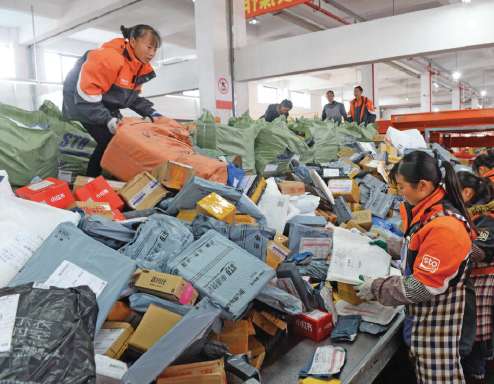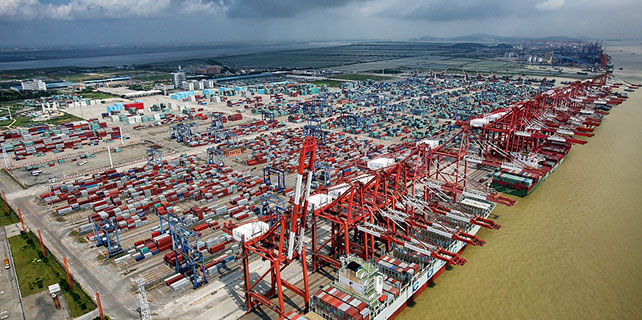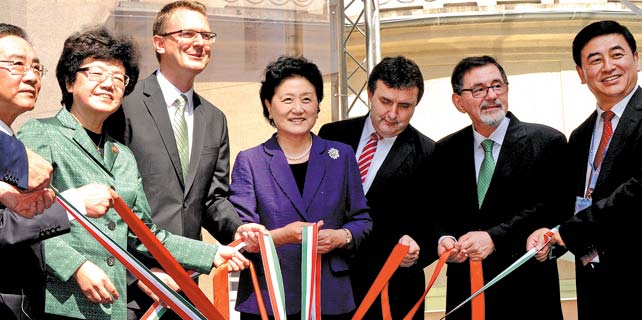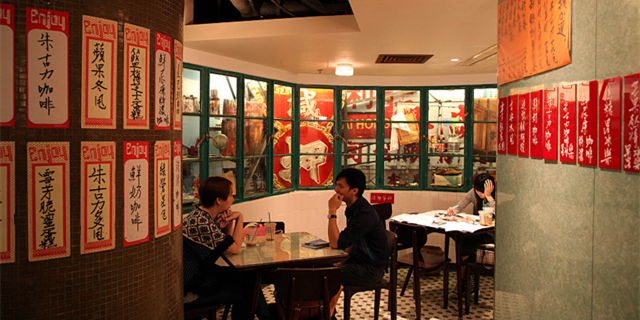Courier giant delivers the goods
Delivery company sees massive expansion as global e-commerce continues to boom
|
 |
|
Employees of STO Express sort parcels at a distribution center in Guizhou province. STO Express UK has established five franchises since 2014, each with its own warehouse and fleet of trucks. |
Tina Zhang still remembers the struggles she had in the aftermath of the 2008 financial crisis, when many of the major British clients of her small courier company were going out of business.
After some major strategic adjustments, in which the company took on new Chinese retail clients, the business merged into giant Chinese courier STO Express in 2014.
"Becoming STO Express UK was a great boost for our brand," she says. "Immediately after that, our weekly new user registration grew from around 100 to 500."
Zhang, who is now marketing manager of STO Express UK, works out of a spacious office that is attached to a 1,500-square-meter logistics warehouse near London's Heathrow Airport.
The growth of the company is well demonstrated through numbers. STO Express UK delivered between 5,000 and 8,000 parcels a week in 2014, a number that has now grown to between 10,000 and 15,000 a week.
During the same period, the number of employees has grown from six to 20.
STO Express UK has also established five franchises, in Edinburgh, Nottingham, Manchester, Newcastle and Sheffield, each with its own warehouse and fleet of trucks.
The company's rapid expansion in the UK can be seen as a reflection of China's cross-border commerce boom.
Chinese research company iResearch says China's cross-border imports grew from 100 billion yuan ($15 billion; 13.8 billion euros; £11.64 billion) in 2014 to 150 billion yuan in 2015.
Even more significant is the growth potential. The data company Research and Markets estimates that China's cross-border e-commerce market will grow to 14 trillion yuan by 2020. The size of the cross-border e-commerce boom follows on from China's domestic e-commerce boom. With $630 billion in sales in 2015, China's e-commerce market dwarfs all others and is almost 80 percent bigger than that of the United States.
E-commerce now accounts for 13.5 percent of total Chinese retail spending, which is the highest percentage among any large economy other than the United Kingdom.
Amid such domestic e-commerce opportunities, STO Express was born. Founded in 1993, it ranks among China's "big four" courier businesses alongside ZTO Express, SF Express, and Yunda Express.
In 2016, STO Express delivered 3.26 billion parcels, which represents a year-on-year increase of 27 percent. The company made 11 percent of China's domestic e-commerce deliveries.
Even with such a strong presence in China, STO Express took a very cautious step when it expanded into its first overseas destination-the UK.
That was when the partnership between STO Express and Zhang's team began. Her team's decadelong history in serving China-UK cross-border trade was crucial.
Zhang's company was called Apex and was established in the UK in 2005 by a Chinese courier company of the same name. At the time, it was the only Chinese delivery company with a UK operation. Two year later, in 2007, Apex's UK management team bought the subsidiary's shares from its parent company. The company continued to use the name and continued to work with the parent Apex company in a partnership that meant the company in China handled deliveries of parcels from the UK once they had crossed the border.
At the time, cross-border e-commerce had not taken off, and couriers such as Apex were focusing on sending time-sensitive documents from the UK to China, or sending samples of products such as clothes and shoes to China so they could be manufactured on a large scale. Such deliveries were also the major work of the big four of global delivery companies at the time: DHL, Fedex, TNT and UPS.
Apex's main advantage at the time was its cost. A typical document that would have cost £35 ($45) to deliver through one of the big four companies would only cost £10 if sent through Apex.
But cost alone was not enough.
"Our major challenge was a lack of brand recognition. It was hard for us to build up customer trust in the early days," Zhang says. Worse still, often, due to various problems with the coordination of the deliveries, shipments were lost on the way to their destination.
Because the company was having difficulty securing retail customers, most of Apex's customers at the time were British delivery companies that needed help delivering parcels in China.
"Focusing on British couriers as clients meant we became too reliant on them, so when the 2008 financial crisis hit them hard, we suffered a lot too," Zhang says.
"When we realized this, we increasingly focused on the retail customer market."
In the years since the financial crisis, a wave of Chinese companies has expanded into the UK, and demand for courier services has grown as they have needed to communicate with headquarters.
Big Chinese companies, including Bank of China, ICBC, Taiping Insurance and China National Publications Import and Export Corp, all became customers.
"They appreciated our service in the Chinese language, and they trust us to sort out whatever issues they may encounter at the first opportunity," Zhang says.
It was not long before Apex partnered with STO Express.
As STO Express UK, Zhang and her team found it much easier to recruit new corporate and retail clients, including many people who owned online shops on the Chinese platform Taobao.
Taobao, which is a part of China's Alibaba e-commerce platform, hosts many online shops established by overseas Chinese who make purchases and send products to buyers in China-a practice known as daigou.
STO Express became a delivery partner for many such shop owners, meaning the range of products it delivered also expanded to include food items and luxury products, among others.
Meanwhile, being part of the STO Express group meant parcels were delivered in China more quickly and efficiently.
Apex used to get most of its parcels to China customs-cleared in either Beijing, Shanghai or Hong Kong, because those were the locations where the company's Chinese partners were concentrated. Now, the company can ship through any Chinese customs clearance point and regularly uses Guangdong, Changsha, Tianjin, Hangzhou and many other places.
"We are able to optimize the logistics arrangements of our parcels, so they will travel shorter distances and be delivered to customers much quicker," Zhang says.
Despite STO Express' established infrastructure and its huge scale, it faces stiff competition, and profits are increasingly under pressure. In fact, the UK-China cross-border e-commerce market has been saturated with courier companies, including many startups that grew quickly on the back of special technology.
One such company is the Hangzhou-based Dolphin Supply Chain, which was founded in 2003. It has invested in large-scale warehouses, a truck fleet and cargo planes in the UK, all in a bid to build an all-in-one infrastructure chain that massively cuts costs.
The company has even developed a real-time monitoring system to track the whereabouts of large e-commerce cargo in order to optimize the process.
Another big player is Parcel 51, which started in 2012 in London as a logistics provider serving UK-China e-commerce. In more recent years, it has been offering consultancy services to British retailers, advising how to sell in China's e-commerce market through a sister company set up by the same owners.
Parcel 51 also has invested in its own warehouse in London where British retailers can deposit their packages before they are sent to China by air. The company's own logistics capacity currently handles between 25 and 30 metric tons of products shipped from the UK to China each day, a significant volume for a new player in the sector.
With increasing competition from a wide range of new players in the market, STO Express has also attempted to reinvent itself, choosing to expand into mainland Europe in an attempt to grab more market share. Within three years of making the decision, STO Express has already established logistics centers in many European countries, including France, Hungary, Spain, the Czech Republic, Russia and Spain. Last year, it became the first Chinese delivery company to launch cargo flights from Europe to China.
The flights, which shuttle between Prague and Hong Kong three times each week, connect to STO Express' fleet of trucks and connect with all countries in Europe, including the UK.
"Our strategy is to increasingly build our own logistics infrastructure across Europe and increasingly take on cross-border activities between European countries. We hope to become the fifth-largest courier business globally," Zhang says.
STO Express UK Ltd
Industry: Logistics
Year of entry into the UK: 2014 Address: Unit 2, Nexus Close, Feltham, TW14 0AF
Parent company in China
Industry: Logistics
Year of establishment: 1993
Operating revenue: 9.88 billion yuan ($1.43 billion; 1.31 billion euros; £1.11 billion) (2016)
Address: 1888 Zhaochong Road, Qingpu District, Shanghai, 201706






















